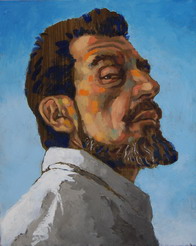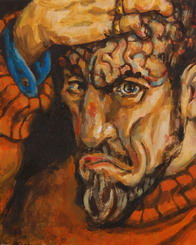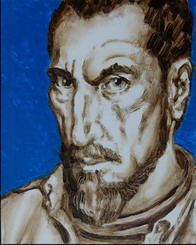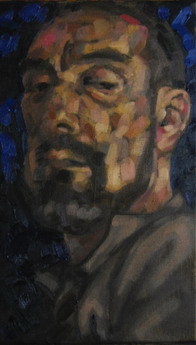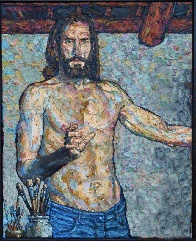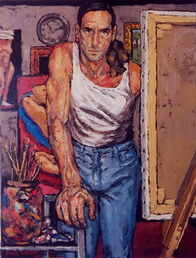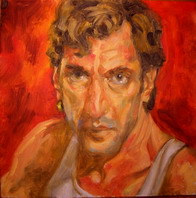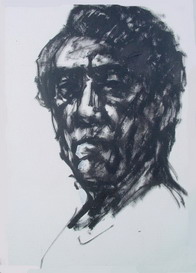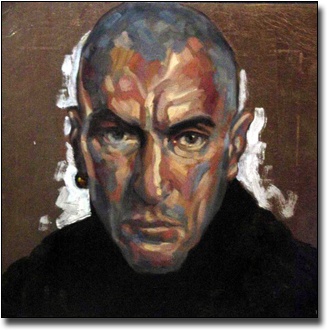Mental Workshop- pg 1 | pg 2 | pg 3 | pg 4 | pg 5 | pg 6 | pg 7 | pg 8 | pg 9 |
<previous | next>
page 8
Thursday April 19, 2007
We'd be better off without Religion. (930 words)
There was a young man from Maldavia
Who couldn’t believe in the saviour
So he erected instead
With himself as the head
The religion of decorous behaviour
I listened to the debate that took place at London's
Westminster Central Hall the 27th of last month for an audience of more
than 2000 people. The debate was over the proposal by three eminent
atheists: Richard Dawkins the evolutionary Biologist & celebrity
author, Christopher Hitchens- Author & journalist & AC
Grayling, professor of philosophy & author. Together they
proposed: "We'd be better off without Religion" & debated the issue
with three prominent religious authorities, a Catholic, a Jew & an
Anglican.
The religious authorities compared favourably with the
rabid & ranting creationists who fought the so-called Scopes II
trials, indeed, none of the three attempted to debate from the platform
of the undeniable existence of a supreme being, in other words: on the
grounds of truth versus falsehood, but rather more modestly in terms of
a pseudo-Kantian innate morality, the small quotidian consolation
religion provides to the moderately religious (while disavowing
extremists or even the truly convinced) & the transcendental
satisfaction of believing in a purpose for human life.
The atheists gave intelligent & irrefutable
arguments chosen from a long list of possibilities & weren’t,
in fact, refuted. All six participants limited themselves to their
prepared speeches & did not actually debate one another’s
points but I am not writing a review nor do I want to go over the tired
& well-known arguments. Instead, I would like to share my
observations & ruminations on the process & sentiments of these
six humans who, despite their differences, share one feeling common to
people everywhere: fear of death- abhorrence of their own
extinction…
But before I get to the point I want to make,
let’s take a moment to examine this fear, so universal it has
probably accompanied man since his first moments of
self-awareness. The only methods any of us have to either
overcome or learn to live with the reality of our death, is either
finding a way to believe in what I affirm is an innate feeling shared
by all humans: that they, we, I, am immortal. The alternative to
finding a way to avoid the evidence & believe in the feeling, is to
ignore the fact during most of our introspective lives. During
the moments the thought of death, our own death, intrudes on our
consciousness we are reduced either to a metaphoric whistling in the
dark or genuine despair & anguish. The third alternative some
might suggest is accepting the fact demurely or- maturely. But I
don’t accept the third option & believe any man who loves
life but convinces himself he can view his own extinction with
equanimity, will realize the fraudulence of his psychology in his last
moments.
Why do we ‘people’ so naturally & commonly feel
immortal? “It is nothing short of proof that it is true!”
proposes the gnostic, but I think the explanation lies elsewhere.
To start with the obvious answer: because we only know life- we
are incapable of imagining our own non-existence. Personally I
think we inconsciently run into a huge obstacle in our manner of
considering our death -- life without us – we artlessly imagine
our own annihilation with ourselves as witnesses to it. I think
the proof the psychology our sense of immortality relies on is
illogical, is that though we share a sense of overwhelming dread at the
thought of the world without us after our death, we none of us suffer
wretched distress at the thought of the world without us before our
respective births.
What about the man who thinks he can face the Grim
Reaper with aplomb? How is it he can fool himself? Ernest Becker gives
us the answer in Denial of Death (for which he was given a
Pulitzer) - paraphrasing from memory: If man could expect to live much
longer than he does in reality, say- instead of seventy to ninety
years, barring accident or disease: seven hundred years, seven thousand
or even seven hundred thousand, if he knew which would be the exact
moment of his death all human psychology would undergo a profound
change. Because as fragile as a man’s hold on life may be,
as weak & slippery as his grip is, he can always close his eyes
with the hope of reopening them…
Under the mocking tones one always hears in atheists
& scientists involved in dialogue with the faithful (especially
Dawkins who is as arrogant as he is brilliant, though I would argue
that that very brilliance denies the possibility of arrogance) is an
undertone of pleading contempt for the theists’ inability to be
more convincing. In the end the most important difference between the
atheistic argument & the evangelical is that all atheists would
love to be proved wrong by the believer. It would be like a man dying
of a terrible disease being surprised by his Doctor with the news his
death isn’t imminent after all & he will in fact live for,
well, eternity. None of the religious, on the other hand, want to lose
their faith- want to be convinced by the atheist there is no God or
purpose to the universe & far more importantly: human
life. This fact alone makes it easier to believe the atheist faces
a hard truth while the theist prefers his lie.
(Incidentally, the motion carried with almost 2000 votes cast, 1,205 in favour of the proposal & 778 against)
What H. L. Menken had to say on the subject:
I believe that religion,
generally speaking, has been a curse to mankind - that its modest and
greatly overestimated services on the ethical side have been more than
overcome by the damage it has done to clear and honest
thinking.
I believe that no discovery of fact, however trivial,
can be wholly useless to the race, and that no trumpeting of falsehood,
however virtuous in intent, can be anything but vicious.
I believe that all government is evil, in
that all government must necessarily make war upon liberty...
I believe that the evidence for
immortality is no better than the evidence of witches, and deserves no
more respect.
I believe in the complete freedom of thought and speech...
Voltaire:
"I disagree with everything you say sir but will defend to the death your right to say it"
I believe in the capacity
of man to conquer his world, and to find out what it is made of, and
how it is run.
I believe in the reality of progress.
I - But the whole thing,
after all, may be put very simply. I believe that it is better to tell
the truth than to lie. I believe that it is better to be free than to
be a slave. And I believe that it is better to know than be ignorant
Comments
TOP
Tuesday April 17, 2007
East Meets West
The recently adopted (by Thailand) Santa Claus arriving at Thae Pae gate in Chiang Mai.

Thursday, March 15, 2007
Thoughts on memory. (660 words)
One of the people who help me take care of this big
house is Peht, a wiry & likeable 49 year old Thai man.
Without meaning any offence or denigration, & with affection
besides, I must also say: he is one of the dumbest humans I’ve
ever met! He hails from a very small village far from any large
urbanisation & was formally educated only until 10 or 11 years old-
mostly in Buddhist teachings as they do in the villages. He does
his job of washing the cars, watering the gardens & suchlike with a
dull, methodical dependability & is always keen when I have an odd
job for him, so I’m not sure ‘lazy’ is the right word
to describe him, it is more a complete absence of ambition, I suppose.
When he has nothing else to do he immediately reverts
to his natural state, usually sat on his favourite bench overlooking
the little river that rushes through the back of the property &
whose gurgling makes the house’s heartbeat. I am convinced
when I look at him sitting there, that there is absolutely no brain
activity going on. Indeed, if I call his name, I can almost
visibly see him kick-start, taking a second or two to work through the
gears to perceptual consciousness.
I have some experience of different meditation
techniques I’ve tried over the years but I have never been very
serious about them or regular in my practice of it. I have known,
however, many who dedicate a lot of time, effort & frustration
trying, year after year, to find a way to just be, to quell reason
& thought; just as Peht does every time he sits down.
I had a friend years ago high in the mountains of
southern Spain, an intelligent & introspective carpenter, a refugee
from an urbane background & rich Barcelona family. Besides
carpentry (& jazz on his double base) he loved to plant things
& every year gave away hundreds of sturdy saplings of indigenous
chestnut, Holm oak & the like, to anyone who would plant them
somewhere. He also liked to meditate. It was while watching
him watch his plants grow, that the thought occurred: If time is a
human construct, then a man who lives like that carpenter stretches his
days by being there in the moment. The man who rushes instead
from one event to the next- feels his days whiz by. I think this
is pretty common reasoning but the consequence is not: the man who
stretches his days may feel he stretches his existence, while the busy man feels his life slipping away, but what is the measure of life?
I would say it is memories. Who, or even what, are we without them? How could we
even form into cognizant individuals without critical evaluation of
previous experience? Even a dog or a worm, for that matter, is capable
of modifying its behaviour through evaluation of previous experience,
i.e. memory...
The thoughts I am writing were initiated & inspired
by a conversation with an Australian acquaintance in his mid-forties,
who spent 10 years of his life teaching meditation in an Ashram in
India. When he & I were talking about these ideas, he thought a
moment & said: It’s true, when I think back on those 10 years
in India I have few memories, just a blur of predictability & lack
of thought.
The busy man, on the other hand, looks back on a deep & eventful history that makes his life seem longer in retrospect.
I seem to hear the word: ‘Balance’, more & more from people my age (mid-forties) while I
still feel that if you take an extreme madness as example, like say-
falling in love, as one of life’s high points; then balance is
the last thing one wants, or at least each in its measure.
Aristotle’s maxim: “Everything in moderation” is,
after all, a form of extremism.
Comments
TOP
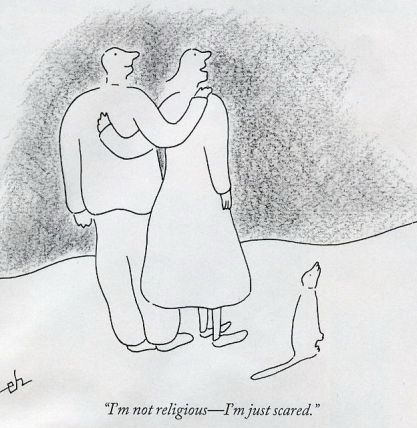
Thursday, March 15, 2007
...What’s the ugliest
Part of your body?
Some say your nose
Some say your toes
But I think its your mind…
My darling, I think it’s your mind.
FRANK ZAPPA
Thursday, February 15, 2007. (980 words)
A note of
introduction: the interesting & original thoughts on art below,
were pasted together & edited by me from various emails its author,
Ilene Skeen, wrote to me in response to my article: 'The Big Question: What is Art?' (below, or click here).
Among other things, Ilene is curator at the lovely old Salmagundi art
club on 5th avenue, anthropologist, published writer & painter.
What is art? Your post is very comprehensive, relating
to history, philosophy and aesthetics. You touched on the essential
problem: that the definition of art is generally so broad that
“it hardly seems to qualify as a distinct word.”
When I began my masters in anthropology, I wanted to find out what art
is, and I thought I might do that by finding out why people do art. I
found that anthropology adds yet another level of complexity to the
discussion by introducing the cultural context. Unfortunately, there
was no simple anthropological answer either. Mainstream anthropology
focuses on societies and economics. The anthropology of art is a
marginalized branch of this discipline.
However, it is my contention that the anthropology of
art is the central, deeper question of anthropology because art in the
broadest sense is a translation of concept to action, and action is
required for survival.— Since all knowledge is contextual, (we
are, after all, all mortal) and life is the context, I believe art has
to do with survival. The survival of an individual versus the survival
of a culture is only a difference of scale: survival at any level takes
skill and energy.
Therefore, not finding a comprehensive definition in
philosophy, history, aesthetics or anthropology, for the purpose of my
thesis, I used Raymond Firth’s simplistic definition of art as
referring “to almost any patterned application of skill” (1).
This would subsume the widest possible usage: from fine art to craft,
to the art of motorcycle maintenance or the art of the deal. Firth
offered his definition as a placeholder, knowing that it was
incomplete, but serviceable.
There are cultures without a tradition of visual art,
but there are no cultures without a tradition of some kind of
patterning i.e. music, dance, cooking, storytelling, hunting or even
partying. You could argue that partying is not art in the fine art
sense, and I would agree, but it is art in the anthropological sense,
especially if the observer can see the pattern and appreciate it.
The question is then, why are patterns important? (As
they obviously are, obvious if for no other reason than their ubiquity
to all cultures). The question can be restated to ask: do patterns have
survival value and if so, what? My theory is that patterns help humans
respond to the world (because they make sense out of the chaos). We
understand much more of what we encounter than other animals, but we
pay the price—we have to integrate our knowledge into our psyches
because the human ‘machine’ is made so complex by its
self-consciousness. In fact, all animals use patterning, we just know
we use it.
My theory about patterning is that patterning helps us
to sleep and that sleep has essential survival value. After air, sleep
is the next most important need of the body. You can last a number of
days without water and more than a month without food, but without any
sleep the mind quits, long before the body gives up. The
mental survival value of sleep (in addition to the physical rest of the
body) is to integrate the chaos of today so that you can react more
successfully to the chaos of tomorrow. Whatever patterns your
culture, family or circumstances produce, you tend to try to repeat
them and integrate new events into your existing framework. When you
have problems integrating the chaos, you tend to remember your dreams.
I know that is not specific for ‘fine art’ as we often
think of it, but that is my starting point. The importance of art is
that it helps you to sleep deeply; visual art shows you a world as a fait accompli, you can accept it or reject it emotionally, but the fact that you respond to it at all is the crucial factor.
I think people tend to believe humans have three basic
needs: food, clothing and shelter. Then they add the need for art,
relationships, et. al. in whatever order dictated by the forces to
which they subscribe. What they don’t think of is the two needs
which go without saying: air and sleep.
The reason man is compelled to create art (patterned
and applied skill) is that it is helpful to dreaming, and dreaming
helps integrate the chaos...and thus increases the chances of survival.
Think of infants getting lullabies, children getting bedtime stories,
adults watching TV to prepare for sleep. In an emotional sense
art’s function both for its creator and observer is to summarize
or order the chaos. Using bedtime here is a simplistic example. Art
encountered any time during one’s day, either as creator,
observer or owner can record an emotional reaction within us that
creates an important memory (another aspect of patterning).
In his book about the St. Louis, MO art market,
anthropologist Stuart Plattner wrote “the nominal criterion for
high art is some meaningful contribution that advances our cultural
vision”(2)
The importance of “cultural vision” to a
society is enormous – the survival of the culture depends on it.
Cultural functions are founded on biological functions. The biological
function of art, therefore, of aiding our sleep brings us back to its
elemental importance as survival tool. When the creator of art makes order from chaos, it can be truly said that the artist is God of the page.
PS: Non- artists will automatically think that this
polemic is against ‘modern’ art, i.e. Jackson Pollock. It
is not – there is order there, as there is in many problematic
and difficult pieces. It is patterning that the observer may accept,
reject or miss entirely.
Ilene Skeen, February 2007
(1)
(Art and Anthropology. In Anthropology, Art and Aesthetics. Jeremy
Coote and Anthony Shelton, eds. pp 15-39. New York: Oxford University
Press. 1992).
(2) (High Art Down Home: An Economic Ethnography of a Local Art Market. University of Chicago Press. 1996).
Comments
TOP
Tuesday, January 23, 2007
Indoctrination. (235 words)
When I look at the moon-

I see the 'man in the moon'-
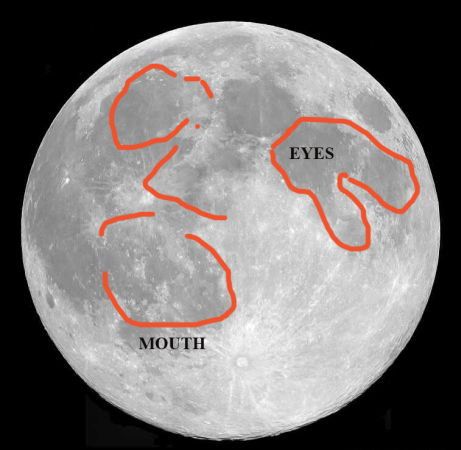
Is that right? Is that the way you see it? Though it is
a bit of a reach I never doubted the interpretation, probably bashed
into my head by my well-meaning mother before I was cognitively cogent
enough to reason for myself (can't blame her, poor thing, she was
probably a victim to her own mother's brainwashing).
Well, I was walking down the street at night with a
Thai person when she said something about the rabbit in the moon... I
began to ask what she meant but at the same time lifted my eyes to the
moon & answered my own question: there it was, a rabbit as big as
life & more obvious. When I asked her, in turn, if she could see
the man's face she thought it was the funniest thing she had ever
heard!- I haven't been able to see anything but the rabbit since...
I even wonder if my 'man in the moon' matched other
people's or if each of us, in his struggle to resolve the image our
mother's (in whom we trusted so implicitly) fervent explanations &
vague gesturing toward the distant object enjoined us to see, actually
made up highly individual choices about what that face looks like.
Which darknesses on the resplendent orb made up the features of the
face...?
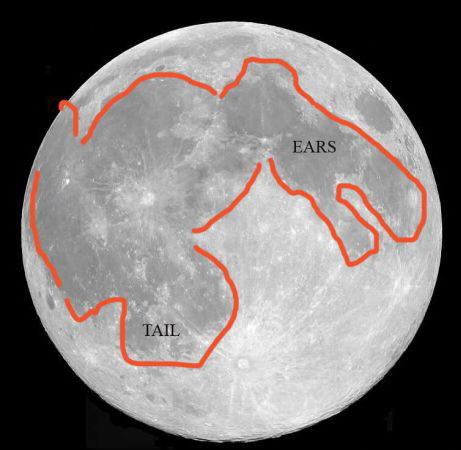
Comments
TOP
Saturday, January 20, 2007. (205 words)
The article from the Nation, one of Thailand's
national papers, reproduced below, reminded me of Spain. I keep finding
chance to marvel at the similarity in attitude between Thai people
& Spanish despite their disparity of culture, distance & lack
of mutual history.
When I lived on the southern, sunny, side of the Sierra Nevada in the
south of Spain, the winter olymipcs were planned one year for the cold
northern side of the same mountain range. The route up to the peaks for
skiing is peppered with old villages that have turned themselves over
to the tourist economy produced by the traffic flow of skiers. The year
of the olympics included much anticipatory investment in hotels &
property investment in general. When it refused to snow that year,
however, the mayor of the biggest village officially proposed the
town's saint be paraded through the streets in hopes the prayers for
snow by the villagers that follow it, might propitiate its fall. (At
the last moment the olympic competition was relocated).
Isaan is the poor & arid area of northeastern
Thailand, undistinguished by Thai people from Laos despite the
political border, (in-fact 'Laos' means: northeast). With the Chinese
year of the pig about to commence:
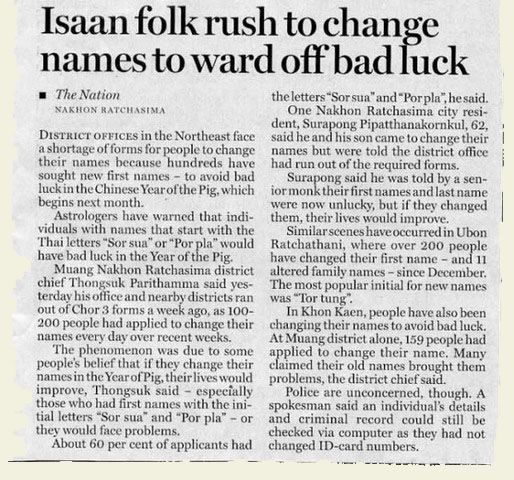
TOP
Thursday, January 11, 2007
The artist & emotion. (840 words)
I have developed & maintained a theory about
happiness that few I have engaged in the conversation agree with,
indeed, I would say, few understand. I have suggested that the
pursuit of happiness is a not only a fallacy but a self-defeating
approach to life. In the excerpts from my book, below, as well as
an article I wrote on the subject (also below) some of the feedback
I’ve had agrees with the evanescent quality of happiness, the
common experience that once achieved, its ability to give happiness
disappears but that is only part of my point, the real point is that
happiness only makes up a part of the satisfying whole that is the
experience of life.
Many consider life more successful according to
the quantity & quality of happiness that can be stuffed into the
minutes that make up the affair of life, while I consider the more
difficult emotional states such as melancholy or rage just as important
to that successful experience. A good example is love; I think
anyone who has experienced the mad state of falling in love agrees it
holds a heightened awareness that is unique to that predicament.
And yet, many who have tasted the god-like quality of being in love
eschew the possibility of its repetition once they have tasted the fall
from glory which is the pain & dejection of having one’s
heart broken because of it. A good example of putting a greater
importance on happiness than the possibilities offered by the range of
emotion available to humans brave enough to feel it all.
I have read Jamison’s Touched with Fire
whose impressively deep research into the connection between manic
depression & art in such subjects as Lord Byron, Virginia Woolfe
& Van Gogh point to a clear correlation. Her attitude
however, is the common one & therefore illuminated some of my own
thoughts without shedding new light on my ruminations. I am
excited for this reason to discover the work of a Harvard professor
called: Dr. Schildkraut who began his studies (in 1959) into the
suicidal & famously gloomy abstract expressionists, Miro, Pollock,
Rothko among others & the question of depression among artists as
an ailment common to artists but ended with a sense that:
“…depression was not a weakness but simply “one of
the things that humans happen to be capable of experiencing.” It
had its uses. “Depression turns you inward,” he explained.
“In some senses the artistic calling becomes easier with a
depressive illness.”
If there was a bright side to depression, Dr.
Schildkraut saw it. “Depression in the artist,” he noted,
“may be of adaptive value to society at large” —
meaning it could inspire great paintings, symphonies and novels.
That’s a controversial idea, insofar as it raises a moral
dilemma: does treatment, while benefiting the patient, come at a cost
to culture?
A victim of manic depressive syndrome is actually a
bipolar personality meaning that as sad as the darkness through which
no light can filter is, it is accompanied by it’s opposite: bouts
of joy that a healthier, more stable, generally understood as
‘more realistic’ personality cannot imagine. Is one
more ‘true’ than another? Is something in the middle,
without the experience of either extreme, better? Or is it mere
mediocrity? Dr Jamison pointed out a behavioural trait of victims of
this emotional instability I found very interesting, self-medication
with a drug such as cocaine is not used by a depressive as cure to
depression but rather by the hippomanic (or the manic depressive in a
state of hypomania) as an attempt to extend the sense of
ecstasy.
My mother who is an art restorer, or as they are known
nowadays: an art conservator, once had twenty or so coloured pencil
drawings done by Jackson Pollock while in therapy. She was
cleaning them in preparation for their sale (later stopped by court
order of the Krassner foundation on the grounds of patient/doctor
confidentiality) by the psychiatrist in whose office they were
done. Apparently, in moments when old Jack the dripper was unable
to express himself with words he drew instead. Dr Schildkraut
discovered, & based all his later groundbreaking research on the
fact he noticed that depressives who didn’t respond to talk
therapy often came to life after taking certain drugs. A groundbreaking
paper that he published in 1965 suggested that naturally occurring
chemical imbalances in the brain must account for mood swings, which
pharmaceuticals could correct, a hypothesis that proved to be correct.
So, should the artist who suffers with his questions
“into direct and lonely confrontation with the ultimate
existential question, whether to live or to die,” (1)
he wrote, “depression may have put them in touch with the
inexplicable mystery at the very heart of the tragic and timeless art
that they aspired to produce.” Be content with his bargain?
Creative expression for personal torment? Or chemical balance &
ignorance of his existential plight?
(1) For a most lucid account of the struggle with this conundrum I recommend Tolstoy's 'Religious Confessions'
Comments
Thursday, December 28, 2006
The Art Critic

TOP
Wednesday, December 20, 2006. (1870 words)
The big question: What is art?
Part I
As a painter I have had a thousand conversations that
begin with the question: What is art? Why is that art? Or: Why
isn’t that art? And a dozen other variations that all mean the
same thing. Sometimes the conversation is with someone without
education in the arts who is genuinely looking to me for an answer;
sometimes it takes the form of debate with another artist or
cognoscenti. But however naïve the person I’m speaking
with is, they always have a vague if distorted view of what
‘art’ is, even if only garnered from Charlton Heston &
Anthony Quinn movies on television. But it is easy to forget that
the Orient has other ideas & here in Thailand no tradition of
visual arts whatever. I began thinking about what I intend to
write as a result of an earnest request by a Thai person to explain
this strange Occidental concept of ‘art’ to her.
The elusive answer is of considerable interest to me
& I have therefore studied the conclusions other artists in history
have come to, listened to those of my contemporaries & been
particularly curious about the reasons given by philosophers. Why
would I place more weight on the opinion of philosophers than artists?
Because the answer to the question lies in the realm of theory while
the act of painting is in the thoroughly distinct realm of
practice.
Although I was shown early on by some art appreciation
teacher how neatly Michelangelo’s Sistine Chapel ceiling can be
divided up into graceful compositional triangles, I believe it only
came out that way because the Maestro’s instincts bade it &
not because he consciously designed the figural placement according to
a geometric formulisation. In this case at least, theory follows
practice.
I have a good friend who is a talented & dedicated
artist whose work I respect; indeed, I like his paintings so well that
I have bought several over the years. (The only real compliment
one can offer an artist!). He, however, has an entirely different
approach to mine & paints ideas. In other words, his
inspiration is the idea the painting illustrates. To me this
approach is just that: illustration instead of art. But it is
also a good example of where theory & practice diverge since, as an
artist, I don’t agree with his approach but find his paintings
are none-the-less, often beautiful.
Let’s start by defining terms- dictionary/encyclopaedia descriptions & etymology:
- c.1225, "skill as a result of learning or practice,"
from O.Fr. art, from L. artem, (nom. ars) "art, skill, craft," from PIE
*ar-ti- (cf. Skt. rtih "manner, mode;" Gk. arti "just," artios
"complete;" Armenian arnam "make," Ger. art "manner, mode"), from base
*ar- "fit together, join" (see arm). In M.E. usually with sense of
"skill in scholarship and learning" (c.1305), especially in the seven
sciences, or liberal arts (divided into the trivium -- grammar, logic,
rhetoric -- and the quadrivium --arithmetic, geometry, music,
astronomy). This sense remains in Bachelor of Arts, etc. Meaning "human
workmanship" (as opposed to nature) is from 1386. Sense of "cunning and
trickery" first attested c.1600. Meaning "skill in creative arts" is
first recorded 1620; esp. of painting, sculpture, etc., from 1668.
Broader sense of the word remains in artless (1589). As an adj. meaning
"produced with conscious artistry (as opposed to popular or folk) it is
attested from 1890, possibly from infl. of Ger. kunstlied "art song"
(cf. art film, 1960; art rock, c.1970). Fine arts, "those which appeal
to the mind and the imagination" first recorded 1767. Art brut "art
done by prisoners, lunatics, etc.," is 1955, from Fr., lit. "raw art."
Artsy "pretentiously artistic" is from 1902. Expression art for art's
sake (1836) translates Fr. l'art pour l'art. First record of art critic
is from 1865. Arts and crafts "decorative design and handcraft" first
attested in the Arts and Crafts Exhibition Society, founded in London,
1888.
- The modern use of the word "art", which rose to
prominence after 1750 is commonly understood to be skill used to
produce an aesthetic result (Hatcher, 1999).
- The quality, production, expression, or
realm, according to aesthetic principles, of what is beautiful,
appealing, or of more than ordinary significance.
(Dictionary.com)
- "The use of skill and imagination in the creation of
aesthetic objects, environments, or experiences that can be shared with
others"
(Britannica Online)
- A statement/criticism more than definition but
interesting especially because of its author’s undisputed status
as artist: "Supreme art is a traditional statement of certain heroic
and/or religious truths, passed on from age to age, modified by
individual genius, but never abandoned. The revolt of individualism
came because the tradition had become degraded, or rather because a
spurious copy had been accepted in its stead."
[William Butler Yeats]
- Another statement by a universally recognized
authority, Leonardo Da Vinci, said in reference to art: “God
creates man translates"
Overall, the etymology & traditional definitions point in one
direction with relative clarity, in the words of the philosopher
Santayana- “Art is for beauty”. The confusion begins,
it seems to me, with Freud, photography, the first world war & its
consequent search for new beginnings, we eventually arrive at this kind
of definition from Wiki-pedia:
- The second, more recent, sense of the word “art” is roughly as an abbreviation for creative art
or ‘fine art’ Here we mean that skill is being used to
express the artist’s creativity, or to engage the
audience’s aesthetic sensibilities, or to draw the audience
towards consideration of the “finer” things. Often, if the
skill is being used in a lowbrow or practical way, people will consider
it a craft instead of art. Likewise, if the skill is being used in a
commercial or industrial way, it will be considered Commercial art
instead of art. On the other hand, crafts and design are sometimes
considered applied art. Some thinkers have argued that the difference
between fine art and applied art has more to do with value judgments
made about the art than any clear definitional difference (Novitz,
1992). However, even fine art often has goals beyond just pure
creativity and self-expression. The purpose of works of art may be to
communicate ideas, such as in politically-, spiritually-, or
philosophically-motivated art, to create a sense of beauty (see
‘aesthetics’), to explore the nature of perception, for
pleasure, or to generate strong emotions. The purpose may also be seemingly nonexistent.
A definition so broad it hardly seems to qualify as a
distinct word, since it essentially allows anything to be labelled as
art & anyone to self-designate as artist.
Any philistine can recognise the beauty of a sunset but
it takes a Goya to show us the beauty in nightmares. Goya said:
Ugliness can be beautiful while prettiness cannot.
I am long accustomed to the response: "Me too", from a
great variety of people when they first discover I am an artist.
I remember one time, however, when someone I met followed his ‘me
too’ with: "I’m a Garbologist!" To the uncomprehending look
on my face he explained “A garbage man, that’s my
art”. I laughed at what I took to be a joke but as he
produced a business card confirming what he claimed, I noted a
serious-peeved look, engendered, no doubt, by what he must have taken
as a distasteful elitist arrogance on my part.
The archetypical example of the confusion between theory & practice, between novelty & originality, is Duchamp’s urinal proclaimed art by the very right of the artist
who recognizes it as such. A brilliant argument, an original
& deep aesthetic philosophy but to me entirely separate from the
undeniable fact that though it may even be argued the object has innate
beauty in its graceful curves, the urinal remains to me, very simply, a
urinal. Dadaism & Duchamp’s elegant language caught the
imagination & the idea influenced all art of the rest of the
twentieth century & yet he himself didn’t appear to take the
object-as-art as seriously as the idea, when he signed it with a
tongue-in-cheek pseudonym that made play (in French) on the name of a
company that built sewers.
I believe that since the aforementioned influences,
WWI, photography & Freud confusing everyone, art’s
democratization has meant the little training most receive in its
study, is neutralised by teachers afraid to state any opinion at all in
their teaching. In classes on actual technique at university I
even found teachers who refused to answer simple questions about
processes like colour theory, for fear of sabotaging my ‘innate
natural expression’. I believe that even if there were such
a thing as ‘natural expression’ as opposed to a progressive
refining of the eye to a sophistication in seeing the beauty in front
of it, accompanied by the tools to present them in such a manner that
others are surprised & moved to have this hidden beauty pointed out
to them, I would still need the tools to express the natural
expression!
As far as the aspect of political obligation on the
artist’s part, I mean in the sense of making social statement, I
think if it happens to coincide with expressive beauty like
Picasso’s greatest work: Guernica or any of Kathe Kollwitz’s
body of work, that is fine; what am I saying? It is wonderful, wondrous
even, like any real inspiration. But making such statements
through art should not be a pre-requisite or justification.
This, I think, must be true if for no other reason than that we know it
doesn’t take great men to make great art. Many are guilty
of far worse than absence of social conscience, like the ultimate
painter’s painter, Rembrandt Van Rijnwho
had his second (common-law) wife locked up in an insane-asylum in order
to be able to collect on his first wife's inheritance. Or the
brilliant Michelangelo Merisi da Caravaggio
who was protected by the Neopolitan city-state from the Roman
city-state, where he was wanted for murder. What importance could
one little murder have when compared to his divine canvases? He died in
a Roman back-alley at 39, in a knife fight.
I once read some bits of the New Testament freshly
translated from the original fragmentary papyri written in Aramaic.
I think there are but few Aramaic scholars in the world but this
book claimed to be the most accurate & literal translation
published to date. Boy, it was a tough read, dull & dry lists
of rules & events written, apparently, by a hand ill-accustomed to
writing. This led me to a curiosity about the King James’
version of the bible & the discovery of Lancelot Andrewes who led the team that translated the 9th century Masoretic
Hebrew into gorgeous poetry, or lyrical prose, that became arguably,
the greatest piece of literature written in the English language.
The fluidity of style points to the fact it belongs to Andrewes
personally, rather than any of the many who made up his team. A
work greater than any by Shakespeare, Lancelot’s contemporary, at
least in the range & breadth of its inspirational impact. I
would contend he might epitomise the role of great artist according to
my definition: He found the beauty & showed it to everyone else.
Comments | What is art? Part II
TOP
RBP said:
What is Art? The answer to that question
is complicated, not only because it is highly subjective but also
because of Art's abstract nature. The definitions that you have quoted
give some idea but none of them really convey the deeper meanings. The
concept does not lend itself to succinct definition and perhaps could
be better explained by metaphors or concrete examples.
The creation and appreciation of Art
seems to be something that is inherent to our humanness, it predates
civilization and is present in some form in almost all societies
(though as you mention Art for its own sake is something that has
developed out of western thinking).
Nowadays the definition is even
more difficult to articulate because the concept has become so much
more encompassing (just yesterday I saw a mover's truck from a major
moving company with the slogan "the art of moving", not to mention your
artist/garbologist). This has added to the overall confusion.
Art could be said to be a way of
interpreting the world and supplying context for our lives and
experiences, but even this does not explain the magic of it- its power,
its influence and its transcendence. It can only be experienced first
hand.
Notice how many of the
definitions you have quoted mention 'skill' as a prerequisite for
creating Art. I think this is important and it is something that has
been somewhat lost sight of. Art can only be created by those who not
only have innate talent but also are dedicated to creating it, those
who are willing to make the effort to acquire the necessary skills. Not
only is there the need to master the materials (the craft skills) but
also to master the skill of correct observation, the skill of
interpreting those observations and the skill of inviting inspiration
based on observation (perhaps the most vital skill for turning craft
into Art). By observation I don't mean only the visual look of objects,
people, animals and environments but also observations of interactions,
emotions, abstract thoughts and whatever else may cross the artist's
path.
While on the subject of
inspiration I must take exception (as you know I would) to your
dismissal of the painting of ideas as a valid inspiration for Art. None
of the definitions preclude this, including your own definition as
surely there is much beauty to be found in ideas; there are innumerable
examples of masterpieces that have been produced this way. This leads
to the notion that it is not so much a question of what you paint but
how you paint it that constitutes Art; or to put it another way: Art is
what artists make, but that leads to a whole other discussion- what
constitutes or defines an artist? Perhaps worthy of another blog-post.
I have always liked the definition I read many years ago: "Art is a lie that reveals a truth"
11th of January
Paul responds:
You missed my point, I didn't dismiss
'painting ideas' at all, or at least didn't mean to. Each artist finds
his own inspiration & one can't judge another's work on those
grounds. I find I don't concentrate well in my studio if I have money
problems, it distracts my inspiration. My father, on the other hand,
did his best work in the most desperate moments- when he had no money
to feed & shelter his family for instance. While painting ideas may
not work for me it obviously works for you; I did say I thought your
paintings "often beautiful"!
P.S.- It was Picasso who said art was a lie that reveals the truth.
Tomas said:
December 23rd, 2006 at 3:08 pm (Tomas is Lithuanian & struggles a bit with English!)
I must confess I had known what the art is some time ago, but recently I became used to question this…
I was searching for the hot discussions, musings-or how could I name
the alive fellowship rightly in English? But currently the traditional
“Do you like it?” wants to appear more and more frequently.
.. I question myself not what is the art, but am I the artist. And I
know just one for sure. We can either talk about the love or to love.
So the artists become the writers and the same questions repeat themselves. What is a literature? Am I the writer or the man?
Is it not a story without an end? So to say, to be or not to be in current modernization: who am I?
Tuesday, November 21, 2006. (1315 words)
This post is in response to something sent to me written by Raymond S Kraft, to read it click here.
It deals with politics, not in my realm of expertise or interest &
I would, therefore, appreciate any comments correcting my ignorance but
I will stand by the underlying thoughts of my statement.
He might be right, he might be wrong, he might be paranoid, but he is
certainly a right-wing xenophobe. If he is right, what exactly is he
suggesting? We wipe out the old & noble Islamic culture world-wide?
(The Western world forgets they are as much at the root of our
culture as the ancient Romans). Force our own style of government
on them? In the same way he accuses them of wanting to do to the rest
of the world? Democracy is not a 'natural order' or the highest point
of social evolution as portrayed by Americans for Americans, it is just
one in a list of possible governing paradigms. As Churchill said:
"Democracy is the worst type of government, excepting all the others".
Kraft's paper is nothing more than fear-mongering &
rabble-rousing. American psyche & moral infrastructure seems
to be entirely directed by television now. If you Google his
name (Raymond S. Kraft) you'll find a wide Internet presence (he
is a California lawyer) but instead of offering reasoned argument his
specialty seems to be riling people's emotions with fear- kind of like
Hitler when speaking to the German people about Jews... ironic, no?
All you have to say to an American, without experience of
enemies landing on his soil, is "The enemy's coming!" for them to
panic. What about Iraq? Invaded three times in the twentieth
century (twice by the English, once by Americans) for the blatant &
unashamed purpose of stealing their oil. The only self-government in
that century (mitigated by treaties forced upon them by the English
& soon by the Americans) were the 23 years of Saddam's rule. A
modern nation just reaching adulthood, not doing so very badly
considering their lack of practice! What was the U.S. government doing
when it was 23 years old? It was involved in a collective effort at
genocide against Native Americans that was largely successful.
Or Afghanistan whose entire history has been fighting
foreigners on their own soil. The children's bedtime story of the
evil Soviets taking over Afghanistan in 1980 (I was in India at the
time) without reason, justification or warning, is a load of
malarkey. What really happened there was that the
Soviets wanted the country not only because of its resources but
its location on their own border. They couldn't just waltz in with
their soldiers for fear of International outrage & reprisal so they
did exactly what Americans & all countries with the means do:
they built schools, roads & hospitals & in return for this good
work (good for the people who know & care nothing about
'governments'- there are parts of Afghanistan even now who think the
American soldiers who suddenly appear from the desert, are Soviet!)
they got influence in the Afghan government. This pissed-off &
scared the Americans whose policy of ‘expansionism’ exactly
matched the Soviet’s (fear, like what this Kraft
fellow deals in, is the easiest means to get people to behave
unreasonably).
The Americans fought the Soviet influence
covertly by supplying arms & means to Afghanis that fought the
governments influenced by Moscow. When the Soviets were forced to
withdraw- these same people the Americans were backing (extremists, of
course, who else fights their own government?) Became the government in
Afghanistan & hence, America's enemies... The Taliban & Muslim
fundamentalism in general may seem outrageously unjust in a
black-&-white way to people who haven't earned their hafiz
by the time they're 12 (a term of respect awarded to he who has
memorized the Koran) but is no different to say, Christian crusades or
Spanish inquisition (who, many don't realize, still had power in Europe
at the beginning of the 19th century). They have every right to govern
themselves as they see fit & without the recourse to people trained
in government since Western powers have killed them all, blown up the
schools & ruined the economy that allows people to go to them...
What Americans desperately need is to look into the mirror of
world opinion, study world history & realize they are as much
the product of their government's propaganda & indoctrination as
any Muslim. They need to clean their own house & learn about others
& thank goodness they haven't the power to turn the world into 'Big
America' just as the Muslims, Soviets, fascists & soon,
Chinese (indeed, everyone) want to do.
Why do people want others to have the same
government/culture/religion as the one they grew up with? (Seldom
chosen rationally but simply the comfortable/habitual one they grew up
with). The psychology is that if others think & live like you, it
rids you of the necessity of introspection & therefore,
doubt... This is clear here in Thailand where no such attitude exists
since everyone really does believe in the same things & other
cultures with which they don’t mix, are simply thought of as
inferior without examination or need for confrontation.
I am also thankful I haven't the nature to give a shit about
politics or governments; I have lived with too many to think
any is more right than any other. If it were up to me I would make the
King of Thailand the King of the world, he is the closest thing to the
Socratic ideal of benevolent monarch/philosopher, (as definition
of the best possible government) I have seen. In a world
which remembers men like Alexander Magno (the Great) &
Ashurbanipal, who ritually sacrificed 100s of thousands of men, as
romantic Hollywood personalities, how can one think Bush or Clinton or
Saddam have any importance in the great scheme of things? Ashurbanipal,
a mere footnote in world history books, ruled the civilized world
during his lifetime & unlike Alexander, grew old. At one time
when made to fight in order to conquer instead of being welcomed
by the conquered, he ceremonially lined up 100,000 men who stood
waiting their turn to have their tongues ripped out with tongs (as
blasphemers for not accepting his rule) & then having their heads
chopped off & put on stakes as warning to any with ideas of
rebellion, wrote beautiful poetry. Probably even more beautiful in its
original Aramaic & I paraphrase from memory:
How can I who have smelled the blood of my enemy
I who have seen the beauty of their piled bodies
I who have made as many sons as a hundred men
& had the lust for battle course through my veins
be accursed by ye the gods with the infirmities of old age?
He reminds me of the old & toothless leader of Baluchistan, a
province of Pakistan so powerful under the renegade's leadership that
they are sometimes at war with their own government, who was recently
quoted in the NY Times: "What could be better after all, than watching
your enemy flee before you & taking his women to your own bed?"
I grew up with the Cold War & clearly remember how common it was
for people who couldn't sleep at night, whose whole lives revolved
around the fear of the 'button' I was one of the ones who refused.
One day we all woke to find the threat gone & I am glad I didn't
waste my emotional energy all those years on feeling fear.
America: you have your own problems, work on
them, by all means improve security if it helps with your fears, but
you have no more right than any Ayatollah or Hitler to force your opinions on the rest of the world. Studying history makes better leaders than studying political science.
TOP
Mental Workshop- pg 1 | pg 2 | pg 3 | pg 4 | pg 5 | pg 6 | pg 7 | pg 8 | pg 9 |
<previous | next>
Links to post titles:
P'sMW- page 1
Four ducks | A painter's style | Thinking with Google | The Vulture's Throat | Tortures of the
Damned | Memory and self | Hinduism and me | The Barber | Glasgow Smile | Airports | False advertising | Buttons | Govandhan pooja | Mean Streets | Population | Back in New Delhi | Buskers | Science and Philosophy | Happiness and Theory of
the Mind |
Boat races in Sarasota | Would
you
kill yourself to go on living? | More Happiness | Theo Jansen's kinetic
sculpture |
ebooks
and writers | Arthur Ganson | Thai politics | Misanthropy | Dying | Googling our minds | Knowledge transfer |
TEDTalks | Viggo | A study in ideal form | Fables | The Ant and the
Grasshopper | Conceptual Art |
The importance of
punctuation | California, first impressions | India | Conspiracy theories |
I love you; thanks’; you’re welcome | Errata | Fear | Egon & the other animals | A note about price:size ratio in paintings | Strange tales |
P'sMW- page 2
Christ’s devil | Timelines | Life's funnel | Souvenirs | Moon Myth | How chaos was subdued in the Japanese genesis myth | Noah Lukeman & the murky world of today’s book publishing | Morality and religion | Music and Love |
Temeris Mortis | The Dream | Peace | God's Tick | Old Man (short story) | Intuition | A Curious Fact |
P'sMW- page 3
Why Humans prefer other Humans to be like themselves | A letter to painters | Why do people talk? |
The Painter's Eye | I'bn al Alhí's treasure (short story) | Associative Personality Disorder |
Love poems, death poems | The Golem | Elitism in Art | Theory of the Mind | Death Scenes | Politics II |
Rock & Roll | Words II- more words | Words |
P'MW- page 4
Confidence | How to steal from gullible artists | Priests behaving badly | How to make a painting | Oats & history |
A note about signatures on paintings | Bob Dylan | Number of atheists among scientists | Theoretical physics & me |
Faust & Mephistopheles | Children's reading habits | How to get good photos of firework | The 20th century |
Further Dialogue on the 20th Century article (here) with comments by Bobby Porter | Love is | Civilisation |
Martial Art as Sport | Blind Boy Fuller | Becoming an artist | Insomniac notes | Mind-brain | Age | José Tomás |
Black Adder | This is not a Blog |
P'sMW- page 5
Dammit! (final comments on the article Karma without metaphysics) | Laic morality (comments on Karma without Metaphysics) | Karma without metaphysics | Chivalric ethics | Shibumi | Shibumi: Comments by Bobby Porter |
Oxford Project revisited | How to travel | How Wang-Fô was saved | Fish memory |
The artist’s relationship to his work | Bobby's response to The artist’s relationship to his work | Egon | 20,000+ |
Memories of my father II |
P'sMW- page 6
Men & Women | Girls: come closer & I'll tell you a secret about men | Catholic Spain | Art is | Bad luck |
Dogs are the Best People | Tough Love | Dense, intense and condensed: a short
love story |
Cubans, Norwegians & me | From the Guggenheim to Santiago's tomb | Memories of my Father | Ecco il uomo |
Divorce & maturity | Inspiration & process | Bulls & men |
P'sMW- page 7
Truth
and beauty | Bugs as food | What is art? part
II- Is modern art, art? | A
painter’s thoughts about self-portraits |
The Piraha of the
Amazon jungle | Thailand: stories
P'sMW- page 8
We'd be better off without Religion | East Meets West | Thoughts on Memory | Scared | Frank Zappa |
Art & Dreams by Ilene Skeen | Indoctrination | Rush to change names in Isaan | The Artist & Emotion |
The art critic | What is Art? Part I | Note of introduction added to the Masculine/feminine article |
Rebuttal to Raymond S Kraft |
P'sMW- page 9
I'm back! | Masculine versus feminine, Muslim versus Buddhist | Driving with Muslims or Buddhists |
Peter Feldstein & Stephen G Bloom's Oxford project | How to
argue | On 'happiness', in answer to Ivan's comment |
Thoughts on Happiness | The birth of Chiang Mai | War
Story | Happiness Versus Suffering |
Cogitations upon observing the life of an ant, from its birth to
its death by old age, while I lay in a bathtub.
June 10, 06
TOP
page 8

